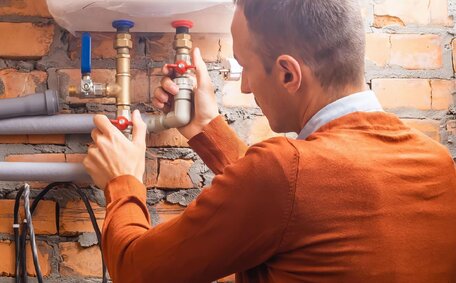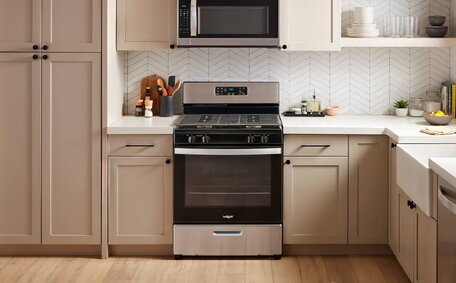Common Causes of Gas Water Heater Failure
Exploring the primary reasons why gas hot water heaters can fail. Some of the most common causes include:
- Faulty pilot light - If your heater’s pilot light frequently goes out, it likely indicates a malfunctioning thermocouple or faulty gas control valve.
- Sediment buildup, resulting from mineral deposits, can accumulate inside the tank. This reduces efficiency in the heated water and can cause overheating or failure.
- Leaking from your water pipe or tank - Leaks cause pressure drops and allow heat to escape, preventing the water from heating properly. They can also lead to dangerous conditions like carbon monoxide build-up.
- Faulty heating elements - In electric systems, heating elements that regulate water temperature can fail or short-circuit.
- Thermostat failure - A faulty thermostat can lead to cold water when the hot water tap is turned on, resulting in an inadequate temperature flow.
- Gas valve defects - Defects in the gas valve can lead to temperature fluctuations or heating failures.
- Insufficient gas supply - Common water heater issues often stem from problems with the gas line, metre or regulator, resulting in low gas flow.
Doing annual maintenance on your water heater tank, like flushing and testing components, can minimise sediment buildup and detect problems early. If you experience your hot water not working, you can use a professional plumber to accurately diagnose and repair your water heater.
Faulty or Damaged Heating Elements
An electric hot water heater depends on its heating elements to keep the water at the correct temperature. When these elements falter, often indicated by a tripped circuit breaker, it compromises the heater’s aptitude to sustain hot water.
Detect the signs water heater elements may show when they malfunction, which include:
- Inconsistent hot water supply - You might experience intermittent hot water, which occasionally fails to meet your needs.
- Not enough hot water for your typical hot water usage expectations.
- Heating water may take more time if there are issues with the elements.
Within the tank, heating elements are crucial for warming the water. Sediment buildup in the water tank and corrosion, possibly involving the dip tube, can cause elements to fail over time. A short circuit can also damage the elements or wiring.
If you suspect an issue with the heating elements, turn your attention to shutting off the gas and water supply valves. Then contact a professional plumber to inspect and replace damaged elements. Doing regular storage tank draining and anode rod checks can also minimise sediment-related element failure.
Sediment Buildup
Over time, you may need replace your tank as sediment from rust, minerals, and other debris can collect at the bottom, potentially impeding function. As this sediment layer thickens, it reduces the burner’s efficiency in getting water heated, as water flow can’t circulate properly to carry the heat.
Signs of sediment buildup include:
- Decreased hot and cold water capacity - Sediment buildup can result in a reduced supply of hot water before it turns cold, impacting your water temperature experience.
- Rumbling or banging noises - Sediment getting stirred up can cause strange tank noises.
- Failure to ignite - Thick sediment can block the check pilot light or burner.
- Higher energy bills - Your system must work harder to provide hot water, battling against poor circulation due to sediment.
To prevent sediment buildup, drain several litres from your hot water system monthly to clear out sediment. Regular anode rod inspection and replacement also protects the inner tank wall from corrosion. Or a professional flush of the heater tank can remove stubborn sediment if problems persist.
Replacing heating elements or burner parts may provide temporary relief, However, if sediment issues persist, replacing the entire unit may be necessary.
Water Leaks
Water leaks are a common issue with gas water heaters. Leaks and reduced water pressure in gas electric water heater systems often result from:
- Corrosion and cracks in the tank
- Failing water connections and fittings
- A faulty temperature and pressure relief valve
- Damaged or worn out drain valve
Small water leaks require quick action, including turning off gas and water to address safety risks and prevent property damage. Even a minimal drop water pressure due to leaks can hasten mould growth, electrical issues, and slippery surfaces. Plus, address any problem your water heater troubles might present, such as a drop in water pressure, as this can indicate more serious issues.
If you notice any damp spots, drips, or puddles around the water heater, turn off the gas line and water supply valves immediately. Afterwards, consult a plumber who can safely manage the gas supply and inspect the unit before reactivating it. Timely repairs prevent leaks from worsening and causing more extensive damage.
Doing periodic visual checks and scheduled maintenance can also catch potential leaks in your hot water system early. Eventually, older tanks corrode and are best replaced every 8-12 years to prevent leaks.
Pilot Light Issues
The pilot light is a small flame that ignites the gas burner to heat water in your gas water heater. Most likely pilot light issues include:
- Heater Heater pilot goes out - If the thermocouple isn’t generating enough electric current, the gas valve won’t open to allow gas to the pilot. Drafts or contamination in the gas line can also blow out the pilot.
- Incorrect pilot flame colour or size - The flame of natural gas should be blue and approximately 5 centimetres tall. Yellow flames or small flames indicate issues.
- Pilot won’t stay lit - Problems with the thermocouple not holding the gas valve open after lighting often occur after releasing the ignition button.
- Pilot won’t ignite - No spark at the pilot could mean the piezo ignition needs replacing or there’s a wiring issue.
If the pilot light repeatedly fails, perform a quick check see whether other appliances are similarly afflicted. Turn off the gas supply and call your local professional plumber to inspect the thermocouple, gas control valve and pilot assembly.
Conduct annual inspections of your pilot light’s flame colour, size, and stability to detect problems early on. The pilot assembly may need cleaning or adjusting to maintain proper gas flow.
Gas Supply Interruptions
Interruptions or reductions in gas supply can leave you without hot water as they prevent gas water heaters from heating properly. Common causes include:
- Issues with gas lines leading to no hot water, water pipes, metres or regulators
- Run out of gas in propane tank
- Gas shut off due to non-payment
- Temporary gas shutoffs in surrounding area
- Main line leaks or pipeline damage
- High demand during cold weather
If your hot water heater fails to ignite or produces low flames, first check if other gas appliances in your home are affected. Contact your utility company if it appears to be a supply issue impacting your house. They can despatch technicians to inspect for leaks, obstructions or pressure problems with gas delivery to your property.
For tankless water systems, regular monitoring is essential to ensure efficient heating performance. Regularly check tank fuel gauges to schedule timely refills and prevent outages. Installing larger tanks or multiple linked tanks ensures you’ll need a consistent hot water supply and backup.
In some cases, sediment, faulty gas valves or defective heating elements or burners may prevent ignition rather than supply issues. Contact a licenced plumber to diagnose the exact cause of gas water heater failure.
Thermostat Malfunctions
The thermostat controls the water temperature inside the tank by signalling the burner when to turn on and off. Some common thermostat issues include:
- Not heating water at all
- Water temperature fluctuations
- Water overheating above the thermostat setting
These issues might turn hot water supply erratic due to thermostat calibration failures, faulty wiring connections, or a bad thermostat that needs replacing. Your water heater going unheated due to a thermostat that fails to turn the burner on won’t provide the warm water necessary for comfortable showers. Loose wiring, interfering with the power supply, allows stray electrical current to continually activate heating, causing temperature fluctuations or overheating.
The ideal thermostat set range is between 120°F-140°F (48°C-60°C). If your hot water is warmer or cooler than usual given your normal thermostat setting, contact a plumber to diagnose and fix the issue.
Doing an annual check of your thermostat calibration and wiring as part of your water heater’s maintenance can help minimise thermostat malfunctions over its lifetime.
Preventative Maintenance
Performing regular maintenance is crucial for preventing many hot water system problems and keeping your unit running efficiently for years.
We recommend annual inspections and tune-ups to catch small issues before they become big headaches. A licenced plumber should:
- Inspect hoses, valves, pipes, gas lines, and fittings for leaks as part of regular checks
- Inspect the burner assembly and clear away any debris or blockages
- Clean the pilot light or igniter and test for proper ignition
- Evaluate heating elements, thermostat calibration and other electrical components
- Flush the tank to remove mineral deposits and sediment
- Examine the anode rod and replace if worn out
- Assess overall condition and lifespan based on age, wear and corrosion
Flush out a gallon of water monthly to control sediment. Check your water temperature and heater sounds occasionally for any changes. Keep your hot water working efficiently by ensuring the unit stays free of combustibles and has proper ventilation.
Preventative maintenance improves safety, efficiency and the operating lifespan of your gas water heater. Coupled with prompt repairs when issues do arise, it reduces the likelihood of complete heater failure.
When Professional Help is Needed
It’s time to call in the experts at Ashfield Plumbing if you experience any of the following with your gas water heater:
- Total loss of no hot water situation
- Leaking water or gas lines
- Soot building up around the exhaust vent
- Faulty pilot that won’t stay lit
- Relighting the pilot provides only temporary fix
- Loud rumbling or banging noises
- A gas smell near the unit indicating a potential gas leak
- The tank is over 8-10 years old
Our licensed plumbers will restore your system to working order, providing a thorough diagnosis and resolving issues with technical proficiency. We get your hot water system assessed to determine whether repairs or full replacement are needed, handle all permitting and paperwork, and ensure the job is done right the first time.
To schedule an appointment or get a free estimate from Ashfield Plumbing, call us at 1300 349 338 or email jobs@ashfieldplumbingservices.com.au. Prevent continued disruptions to your hot water supply by contacting the professional plumbing team you can trust.






